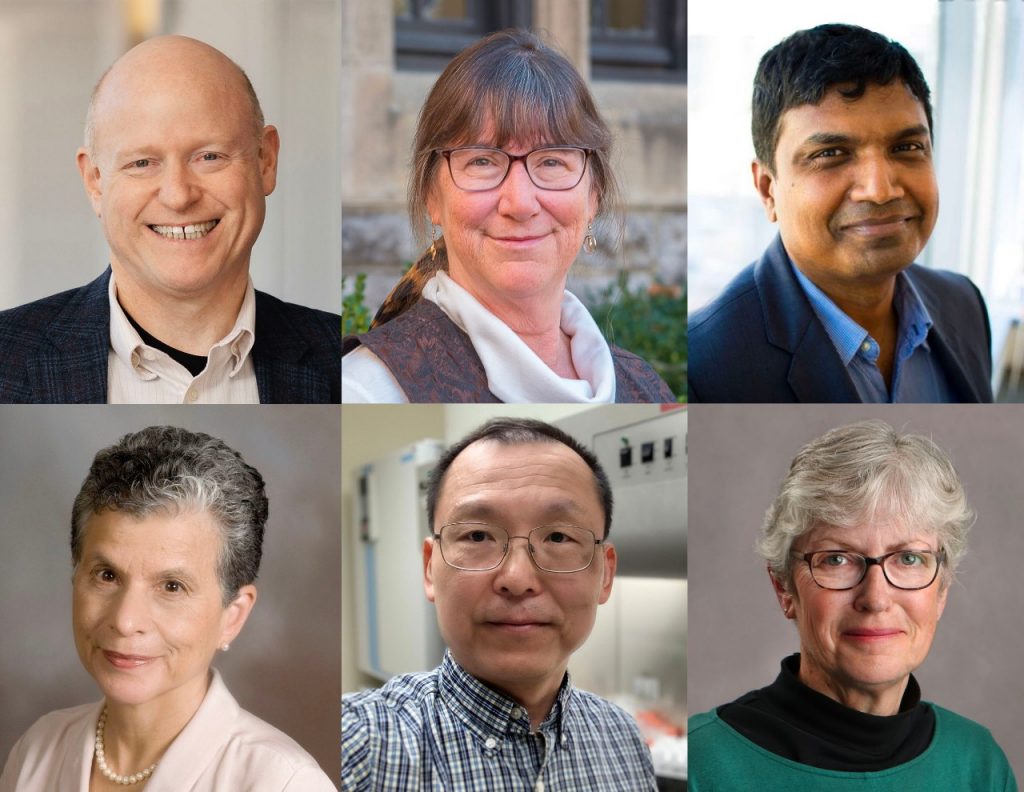The American Association for the Advancement of Science (AAAS), one of the world's largest general science societies and publisher of the Science series of journals, has named its 2023 class of fellows.
Six Virginia Tech researchers have been selected to join the newest class of 502 scientists, engineers and innovators. The newly elected AAAS Fellows represent the fields of biological sciences, chemistry, medicine, engineering, followed by neuroscience and physics.
“We congratulate the researchers who have been recognized as lifetime fellows for their groundbreaking contributions to the scientific community,” said Dan Sui, senior vice president for research and innovation. “These highly regarded researchers are developing and improving technologies and innovations that inform new pathways in wireless communications, machine learning algorithms, mineral physics, plant metabolism, and the diversification of computing fields. ”
“As we celebrate 150 years of AAAS Fellows, AAAS is proud to recognize these newly elected individuals. This year’s class embodies scientific excellence and builds trust in science throughout the communities they serve. and advance scientific achievements while leading the next generation of scientists,” said Sudip S. Parikh, CEO of AAAS and executive publisher of science journals. In an association news release.
The Virginia Tech class joins notable scientists such as Mae Jemison, the first Black woman to go to space. Steven Chu, Nobel laureate in physics and 12th U.S. Secretary of Energy. W.E.B. Dubois, considered the founder of American sociology. Ellen Ochoa, veteran astronaut and the first Hispanic and second-ever female director of the Johnson Space Center. Grace Hopper is a pioneer in computer software development and programming languages, among other things.
AAAS Fellows at Virginia Tech Class of 2023
Eric Burger, Research Director, NextG Security Research Professor
An entrepreneur and technology leader, Berger helps guide the research direction of the Commonwealth Cyber Initiative, an unprecedented statewide cybersecurity consortium comprised of more than 40 Virginia universities. Masu. Mr. Berger, former chief technology officer of the Federal Communications Commission, has been named his 2023 Fellow of the National Academy of Inventors. He is also the technical director of the NextG Alliance, an initiative dedicated to advancing wireless technology leadership in North America.
Liu Li, Professor of Biological Sciences
Lee and his group pioneered the concepts he is cited for. He argues that systemic low-grade inflammatory/injury signals generate low-grade inflammatory leukocytes and persistent damage to the vasculature that contributes to the development of chronic inflammatory diseases such as atherosclerosis. We found that it may contribute to His research has led to the fundamental principles and underlying mechanisms of innate leukocyte branching dynamics in adopting either low-grade inflammatory, resistant, or exhaustion memory. Lee, a Fellow of the American Heart Association and a Faculty Fellow in the School of Science, is developing effective therapies to rejuvenate exhausted white blood cells and restore innate immune homeostasis for the treatment of acute and chronic diseases. We are working on further developing our strategy.
Naren Ramakrishnan, Thomas L. Phillips Professor of Engineering
In addition to his core technical contributions to computer science and data science, Ramakrishnan's predictive research has influenced many fields, including epidemiology, social science, and political science. He led the design and implementation of systems focused on predicting disease outbreaks, civil unrest, mass migration, and elections around the world. This research contributed to a predictive methodology involving previously untapped data sources, new machine learning algorithms to identify precursors to events, and new information fusion approaches to generate alerts.
Nancy Ross, Professor of Mineralogy
- Affiliation: Faculty of Science, Department of Earth Sciences; Faculty of Engineering Materials and Culinary Engineering
- AAAS Award: For significant and continuing contributions to mineral physics, crystal chemistry, and high-pressure research related to Earth's mantle mineralogy and structurally related technical compounds.
Ross is known for his influential role in applying lattice mechanics and principles of atomic bonding and structure to derive governing principles of material stability and sustainability, as well as in the field of geochemistry and mineralogy using neutron sources. is known for its leadership in the expansion of
Barbara Rider, J. Byron Maupin Professor Emeritus
- Affiliation: Faculty of Engineering Department of Information Engineering
- AAAS Award: For significant contributions to programming languages and outstanding leadership to the community, particularly in expanding participation in computing.
Ryder served from 2008 to 2015 and was the first female chair of the College of Engineering and Computer Science. After her retirement, the department established her Barbara G. Ryder Fund for Excellence in Computer Science. Ryder's research interests focus on static and dynamic program analysis of object-oriented systems, and the use of practical software in her tools to ensure the quality and security of industrial applications. I was there. She was named a Fellow of the Association for Computing Machinery (ACM) in 1998. Ryder has received numerous awards, including the ACM President's Award, the ACM Software Engineering Special Interest Group Distinguished Educator Award, and the National Center for Women in Engineering's Harold She Notkin. Award for graduate student teaching and research.
Brenda Winkel, Professor of Biological Sciences
- Affiliation: Former head of the Department of Biological Sciences, Faculty of Science, former head of the Department of Biological Sciences, Faculty of Science.Chief Scientist at Fralin Life Science Institute
- AAAS citation: For outstanding contributions to the field of plant metabolism, particularly for elucidating the subcellular organization of metabolic pathways to study basic plant development and their applications to human health.
Winkel's research has primarily focused on understanding the subcellular organization of metabolism, with a focus on flavonoid biosynthesis in the model plant Arabidopsis. Her group provided the first direct evidence for the existence of long-proposed flavonoid multienzyme complexes and made the surprising discovery that these enzymes can be localized to the nucleus. More recently, her team found evidence that flavonoid metabolites influence the circadian clock in plants. Winkel also maintained a 22-year collaboration with Karen Brewer's group in the Department of Chemistry, working on the development of novel polymetallic anticancer drugs until Brewer's death in 2014.


